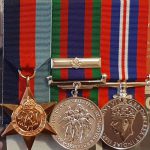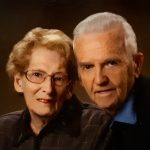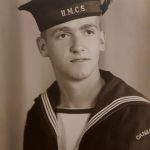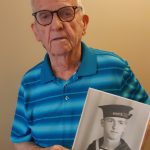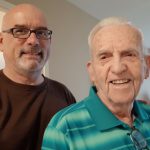Carl was born in 1925 in Brighton, Ontario. He grew up on a farm during the Depression, and some of his earliest memories include seeing classmates in tattered clothing. His family relocated to Belleville when it was time for Carl to attend high school, and it was after graduation that he made the decision to join the service. Carl chose the navy, having grown up near the shores of Lake Ontario. Training took him to several locations in Ontario, notably Kingston and London. Carl had hoped to become a radio artificer, but he was selected for officer training. He was sent east to Nova Scotia, first to HMCS Cornwallis and then HMCS Stadacona. He was then assigned to his first ship, the HMCS Trail, a corvette that was being refitted at that time. When the ship was out of dry dock, they set south for Bermuda for on ship training. While in Bermuda, a training error was made by the new captain: the ship was too close to depth charges being set off in an exercise. The ship was damaged and had to go back to dry dock in Bermuda for much of the winter of 1944, and Carl and his crewmates had to wait out the repairs. Once ready, they headed north, back to Halifax and the war. They were given orders to report to a convoy, and the western Atlantic would become their home for the remainder of the war. The Trail stuck to the Triangle Run, operating between Halifax, St. John’s and Boston or New York. Carl did duty on a number of convoys in the closing months of the war, and when VE Day came along he recalls that the entire crew of his ship signed on for the Pacific War, though that never came to pass. With the war over, Carl turned to his education; he attended Queen’s University and the Ontario College of Education, becoming a teacher and guidance counsellor, eventually retiring after 17 years as a professor at the Faculty of Education, University of Toronto. Along the way he married and raised a family, falling into the rhythm of postwar Canadian life.
Carl Bedalwas interviewed by Scott Masters, in his home in Aurora, in June 2019. We thank the Memory Project for their part in facilitating this connection.
Videos
Click next video below to keep watching
